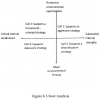Strategic Management - Environmental Analysis and Diagnosis
Politico- Legal Environment - Environmental Analysis
Posted On :
The various forces in political and legal environment direct and restrict business decision-making.
Politico- Legal Environment
The various forces in political and legal environment direct and restrict business decision-making.
Political environment – Attitudes of Government and legislators change with social demands and beliefs. Government affects every aspect of life. For instance, strong pollution norms many result in closure of a company. Government not only promotes but also constrains business. Promotion is possible by stimulating economic extension and development, by providing subsidies to SSIs, tax advantages, support to R&D and protecting business in priority sector. Also, government can be the biggest customer. The public announcements of government, the observations in plan documents indicate government policies. E.g.: Industrial policy resolution, 1948 and the economic policy, 1991.
Several European Countries restrain the use of children in commercial advertisements. In India advertisement of cigarettes must carry the statutory warning that “Cigarette smoking is injurious to health.”
The prevalence of political uncertainty has effect on the business strategies. In the presence of political uncertainty, no business likes to commit itself for long term strategies or investments while the uncertainty countries. Therefore the companies focus more on preparing alternative plans for different emerging situations.
Legal environment – It consists of judiciary and legislation. It constrains and regulates business. There are several legislation like the Company act 1956, the Payment of wages Act, 1936 and Factories Act 1948. There are judiciary arrangements like courts and tribunals.
Indian business environment is undergoing a sea change since 1991 after economic reforms were introduced. Fredrick Gluck, Director of Mckinsey & Company concludes his observations in the following words:
“It is no exaggeration that in an industry that is, or is rapidly becoming global, the riskiest possible posture is to watch as more aggressive companies use this growth to capture economies of scale and learning. The domestic competitor will then be faced with an attack
A number of measures have been announced to facilitate private entry into areas of infrastructure which were formerly the prerogative of the public sector with a view to freeing scarce public resources for social sector. These include natural resource sectors, and non-tradable infrastructure services such as electricity, internal transport telecommunications.
1. The National Mineral Policy was revised and the Mines and Mineral Development Act amended to open up this sector to private and foreign investment. Thirteen minerals were de-reserved for exploitation by the private sector.
2. The R.B.I passed automatic approval policy for
foreign investment was made applicable to mining (except for atomic minerals
and mineral fuels) subject to a limit of 50% on foreign equity.
3. The power sector policy framework attracted 138
private proposals for creating 58,745 mega watts of capacity with an investment
of Rs.2,19,927 crores. Of these, 41 proposals are from foreign investors or are
joint ventures with foreign partners, of which thirteen have already been
cleared by the government.
4. The National Tele-communication Policy, 1994 allows
private provision of basic telecom services. Implementation has begun after
announcement of rules and procedures.
5. The New Air Corporation Act, 1994 enables private
Air Taxi Companies to operate as regular domestic airlines. Nine Air Taxi
operators, complying with Aircraft Rules have been granted “scheduled airlines”
status.
The various forces in political and legal environment direct and restrict business decision-making.
Political environment – Attitudes of Government and legislators change with social demands and beliefs. Government affects every aspect of life. For instance, strong pollution norms many result in closure of a company. Government not only promotes but also constrains business. Promotion is possible by stimulating economic extension and development, by providing subsidies to SSIs, tax advantages, support to R&D and protecting business in priority sector. Also, government can be the biggest customer. The public announcements of government, the observations in plan documents indicate government policies. E.g.: Industrial policy resolution, 1948 and the economic policy, 1991.
Several European Countries restrain the use of children in commercial advertisements. In India advertisement of cigarettes must carry the statutory warning that “Cigarette smoking is injurious to health.”
The prevalence of political uncertainty has effect on the business strategies. In the presence of political uncertainty, no business likes to commit itself for long term strategies or investments while the uncertainty countries. Therefore the companies focus more on preparing alternative plans for different emerging situations.
Legal environment – It consists of judiciary and legislation. It constrains and regulates business. There are several legislation like the Company act 1956, the Payment of wages Act, 1936 and Factories Act 1948. There are judiciary arrangements like courts and tribunals.
Indian business environment is undergoing a sea change since 1991 after economic reforms were introduced. Fredrick Gluck, Director of Mckinsey & Company concludes his observations in the following words:
“It is no exaggeration that in an industry that is, or is rapidly becoming global, the riskiest possible posture is to watch as more aggressive companies use this growth to capture economies of scale and learning. The domestic competitor will then be faced with an attack
A number of measures have been announced to facilitate private entry into areas of infrastructure which were formerly the prerogative of the public sector with a view to freeing scarce public resources for social sector. These include natural resource sectors, and non-tradable infrastructure services such as electricity, internal transport telecommunications.
1. The National Mineral Policy was revised and the Mines and Mineral Development Act amended to open up this sector to private and foreign investment. Thirteen minerals were de-reserved for exploitation by the private sector.
6. The National Highway Act, has been amended to
enable levy of tolls on national highway users. Government intends further
amendment of the Act of allow private participation in construction,
maintenance and operation of roads on Build-operate-Transfer (BOT) basis.
Tags : Strategic Management - Environmental Analysis and Diagnosis
Last 30 days 1134 views















